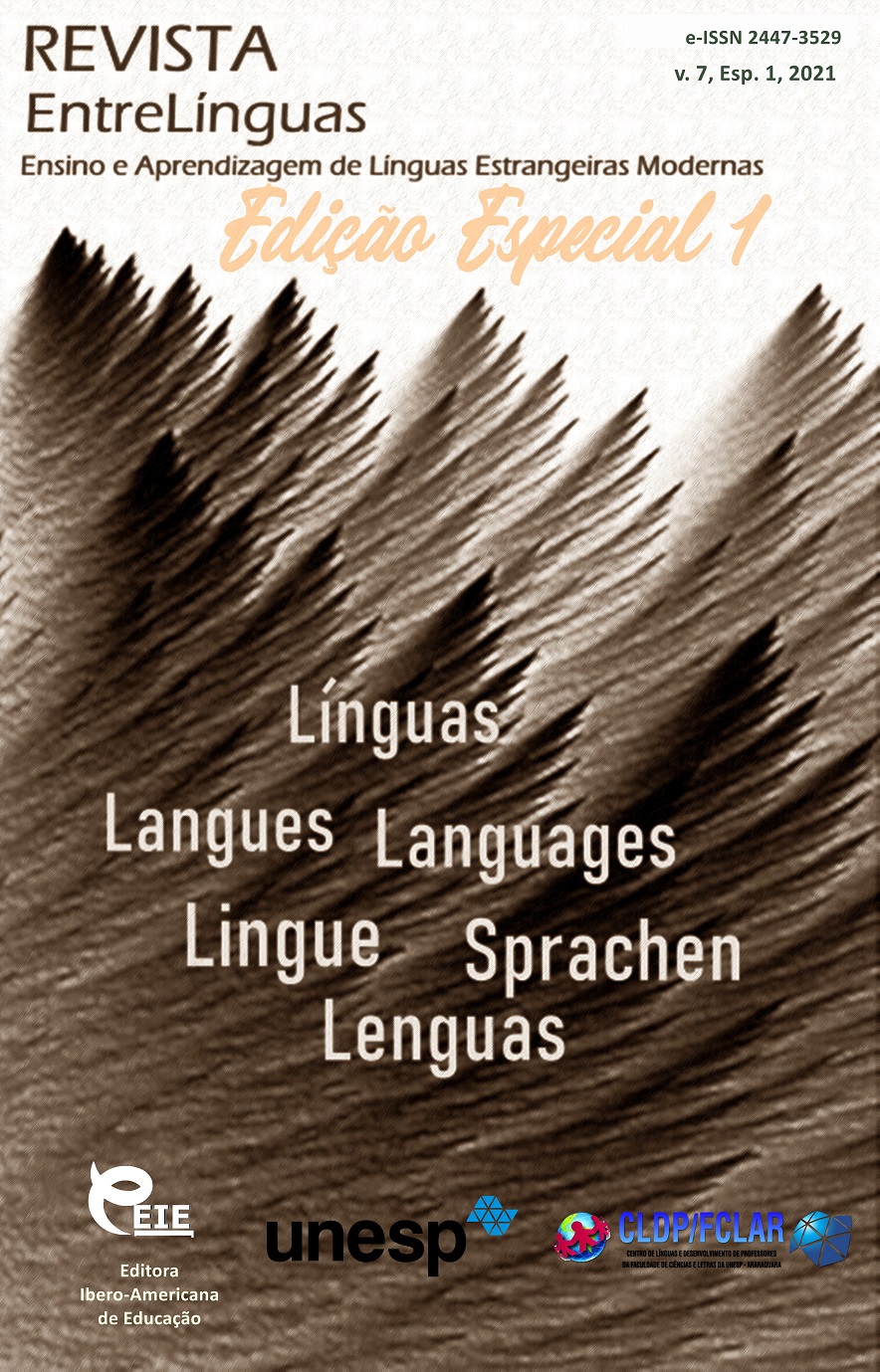Advertising as a platform for language game
DOI:
https://doi.org/10.29051/el.v7iEsp1.14854Keywords:
Advertisements, Language game, Onomatopoeia, Homonyms, Nonce wordsAbstract
The present study is devoted to the language game as a widespread advertising phenomenon. With reference to contextual analysis of language games in advertisements, the article considers the achievements of the main advertising goals (to attract potential consumers and influence their buying behavior) by virtue of various creative language means. The article discusses and analyzes different types of language games based on phonetics, lexical and grammatical means of the Russian language. Cases of language game with the use of onomatopoeia, homonyms and nonce words are emphasized. The specific features of the linguistic phenomenon in advertising are illustrated with appropriate examples. Reportedly, advertising makes possible the language game and, in certain cases, is an ideal environment for its implementation. Considering the language game as an integral part of the advertising discourse, the authors of the article draw conclusions about the similarity of the communicative goal in the language game and advertising. Apart from contributing to the theory of advertising from the standpoint of modern linguistics, and to the development of the language game theory, the results of the study explore creative possibilities of language, including in advertising.
Downloads
References
AGEEVA, J. Communicative Tactics of Persuasion in Sales (Lexical-Semantic Aspect). In: INTERNATIONAL MULTIDISCIPLINARY SCIENTIFIC CONFERENCE ON SOCIAL SCIENCES AND ARTS, 4., 2017, Bulgaria. Anais […]. Bulgaria: SGEM, 2017. p. 629-636.
AGEEVA, J. Communicative Tactics of Persuasion in Sales (Lexical-Semantic Aspect). In: INTERNATIONAL MULTIDISCIPLINARY SCIENTIFIC CONFERENCE ON SOCIAL SCIENCES AND ARTS, 4., 2017, Bulgaria. Anais […]. Bulgaria: SGEM, 2017. p. 629-636.
AGEEVA, J.; YU, V. Functioning of Professional Vocabulary in New Business Discourse. In: INTERNATIONAL SCIENTIFIC CONFERENCE, 13., 2018. Current issues of the Russian language teaching. Anais […]. 2018. p. 520-525.
GIMRANOVA, T. A.; KOLOSOVA, E. I.; SEMUSHINA, E. Y. Indirect tactics of speech influence in the political discourse, Iioab Journal, p. 40-43, 2018.
GRIDINA, T. A. Language game: stereotype and creativity. Yekaterinburg: Ural State Pedagogical University, 1996. 215 p.
GUZAEROVA, R. R.; BASTRIKOV, A. V. Miao Sun. Mediaspace as a Special Sphere of Production an Extra-Dystemic Vocabulary (on the example of Russian Feminitives with suffixes -ecc(a), -c(a)). Turismo-estudos e praticas, n. 2, p. 1-7, 2019.
ILYASOVA, S. V.; AMIRI, L. P. Language game in the communicative space of the media and advertising. M.: Flint, 2009.
LEBEDEVA, E. B. On clarification of the term" language game" in linguistics. 2014.
MIFTAKHOVA, A. N.; BOCHINA, T. G.; SERGEEVA, E. Gender interpretation of woman lexeme in internet discourse. Journal of Pharmacy Research, v. 11, n. 11, p. 1336-1340, 2017.
MIKHAYLOV, N. N. English for hospitality and tourism. Moscow: Akademia, 2011. 198 p.
NETYAGO, N. V. Lexicology of modern russian language: kick start for international students: [study guide]. Moscow: Ministry of Education and Science of the Russian Federation, Ural Federal University; Yekaterinburg: Publishing House of Ural University, 2016. 100 p.
ROZENTHAL, D. E. Dictionary of linguistic terms. In: ROZENTHAL, D. E.; TELENKOVA, M. A. Teacher’s resource book. 2. ed. rev. Moscow: «Prosvescheniye», 1976. 543 p.
SCHURINA; YU, V. Precedent-setting Elements in Structure of Small Comic Genres. Russian Linguistic Annual Book, Krasnoyarsk, v. 1, n. 8, p. 77-84, 2006.
SHULEZHKOVA, S. G.; WALTER, H.; BOCHINA, T. G.; KOSTINA, P. M. Slogans appeared during the crimean spring in the political discourse of modern Russia. Issues of Cognitive Linguistics, v. 5, p. 358-361, 2017.
YAPPAROVA, V. N.; AGEEVA, J. V.; AGMANOVA, A. Y. Pre-election discourse as a special type of institutional discourse. Helix, v. 8, n. 1, p. 2324-2327, 2017.
YAPPAROVA, V. N.; BOCHINA, T. G.; SADYKOVA, I. A. Genre originality of the modern diplomatic discourse. Journal of Language and Literature, v. 7, n. 3, p. 195-198, 2016.
YARTSEVA, V. N. Lingvisticheskiy entsiklopedicheskiy slovar’[Linguistic encyclopedic dictionary]. Moscow: Sovetskaya entsiklopediya Publ., 1990.
ZEMSKAYA, E. A.; KITAYGORODSKAYA, M.V.; ROZANOVA, N. N. Language Game. In: Conversational russian speech: phonetics. Morphology. Vocabulary. Gesticulation. Moscow: Nauka, 1983. p. 182-214.
Downloads
Published
How to Cite
Issue
Section
License

This work is licensed under a Creative Commons Attribution-NonCommercial-ShareAlike 4.0 International License.
Os manuscritos aceitos e publicados são de propriedade da Revista EntreLínguas. Os artigos publicados e as referências citadas na Revista EntreLínguas são de inteira responsabilidade de seus autores.
Transferência de direitos autorais – autorização para publicação
Caso o artigo submetido seja aprovado para publicação, já fica acordado que o(s) autor(es) autoriza(m) a UNESP a reproduzi-lo e publicá-lo na EntreLínguas, entendendo-se os termos “reprodução” e “publicação” conforme definição respectivamente dos incisos VI e I do artigo 5° da Lei 9610/98. O artigo poderá ser acessado pela rede mundial de computadores (Internet), sendo permitidas, a título gratuito, a consulta e a reprodução de exemplar do artigo para uso próprio de quem a consulta, desde que haja a citação ao texto consultado. Essa autorização de publicação 328 EntreLínguas, Araraquara, v. 1, n .2, p. 323-328, jul./dez. 2015 não tem limitação de tempo, ficando a UNESP responsável pela manutenção da identificação do(s) autor(es) do artigo. Os artigos publicados e as referências citadas na Revista EntreLínguas são de inteira responsabilidade de seus autores.











